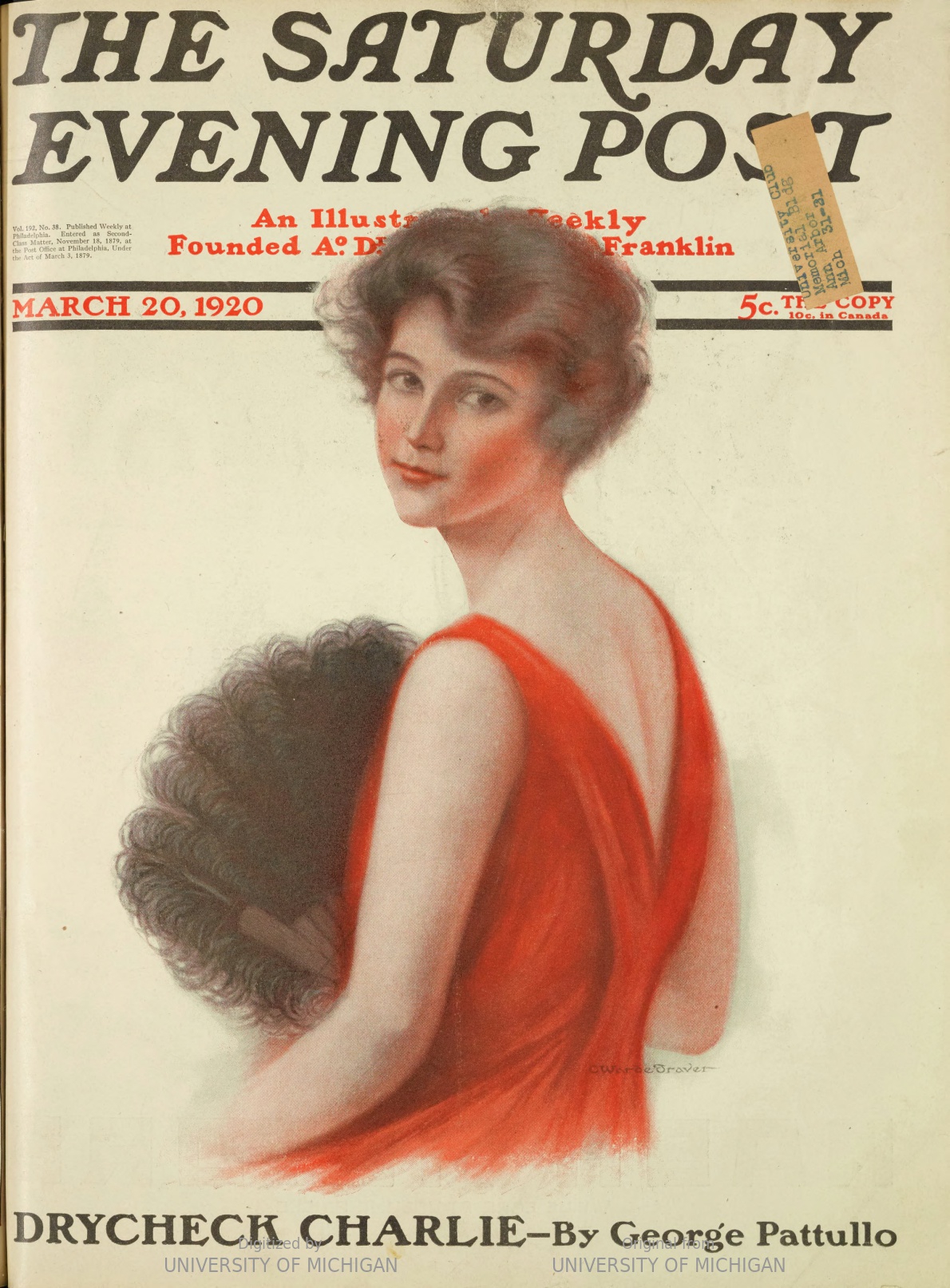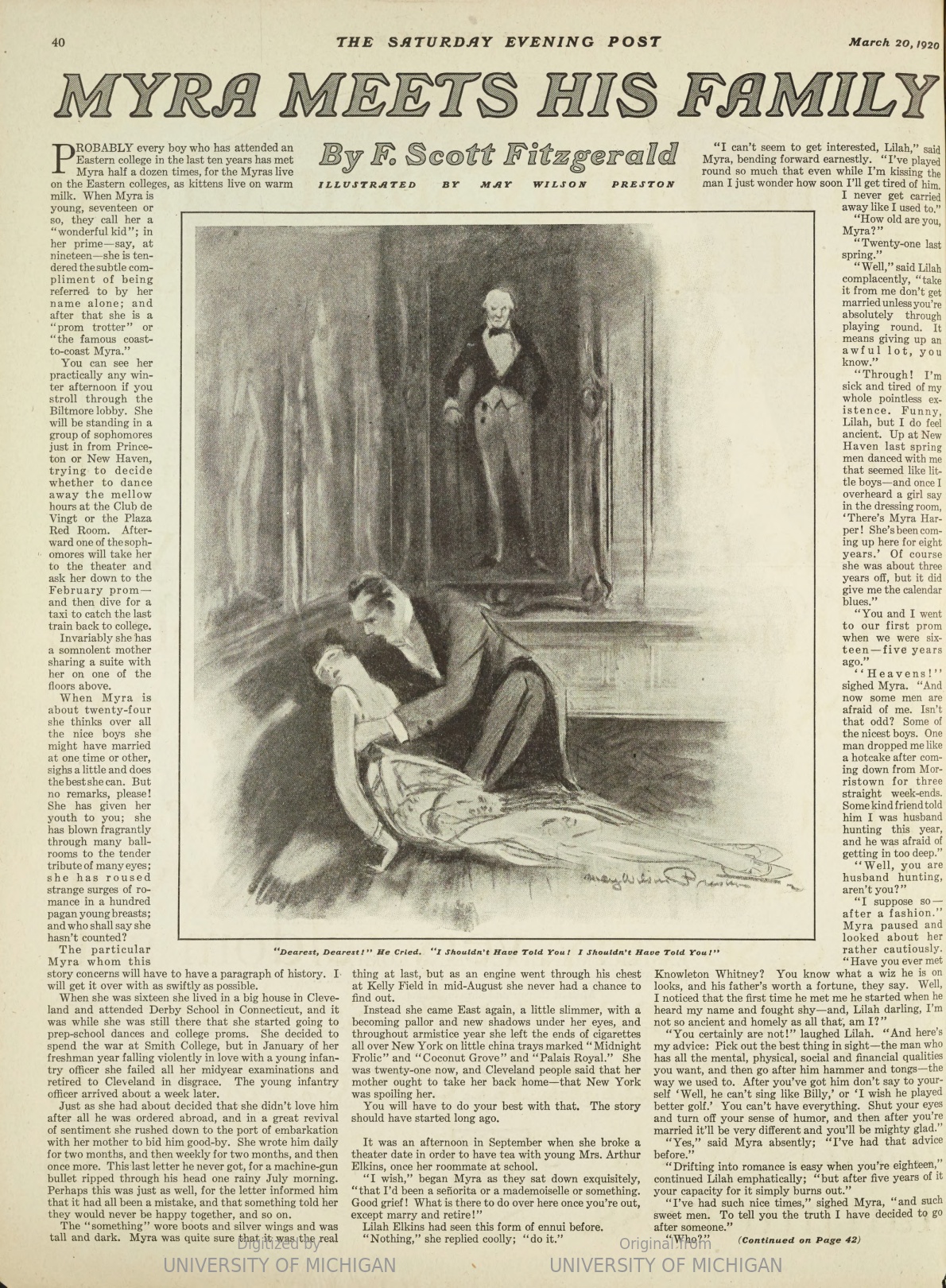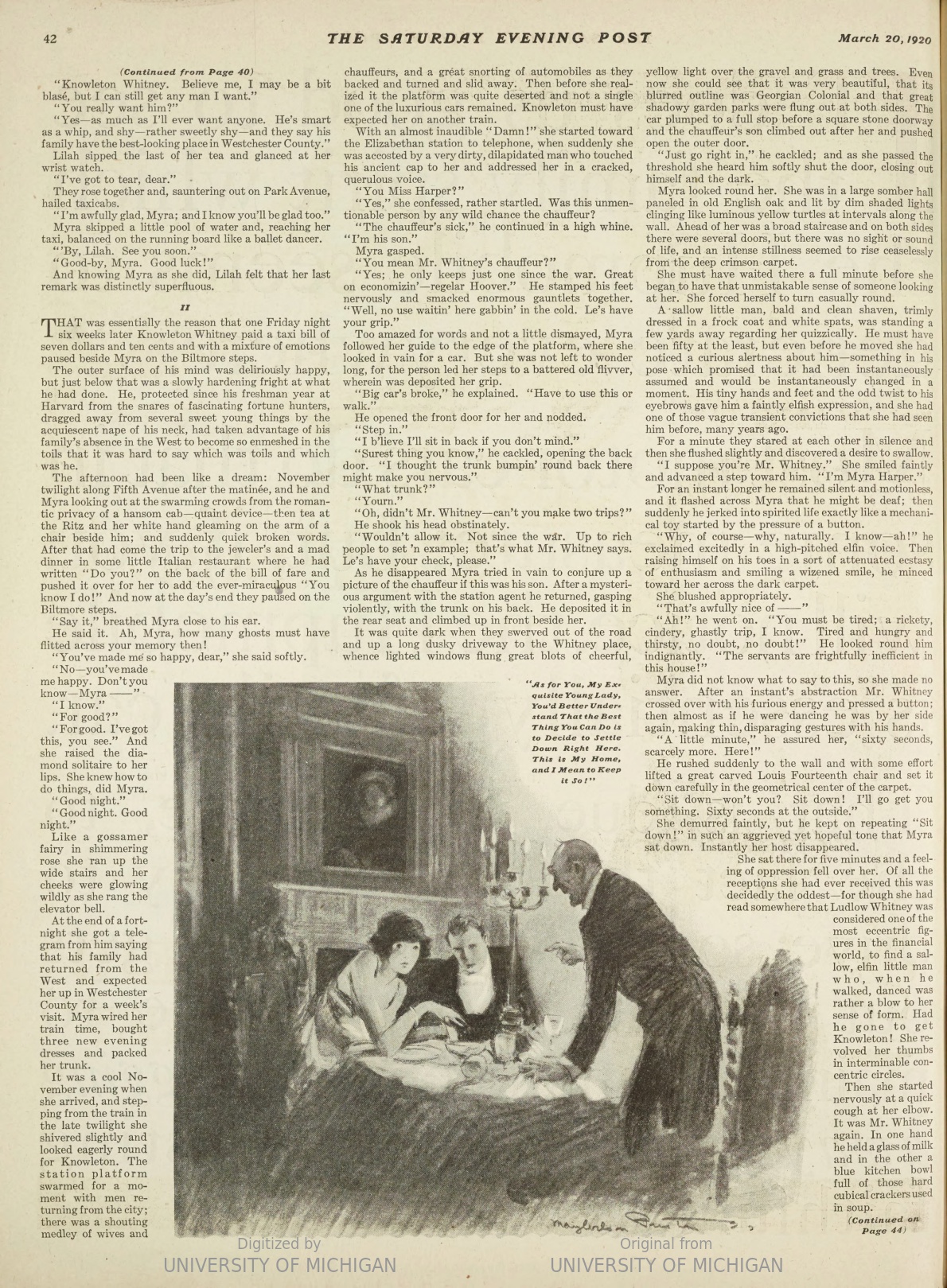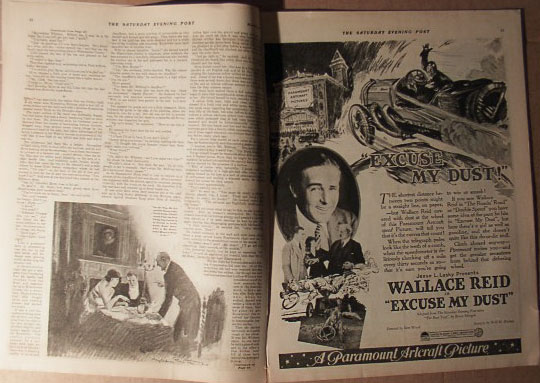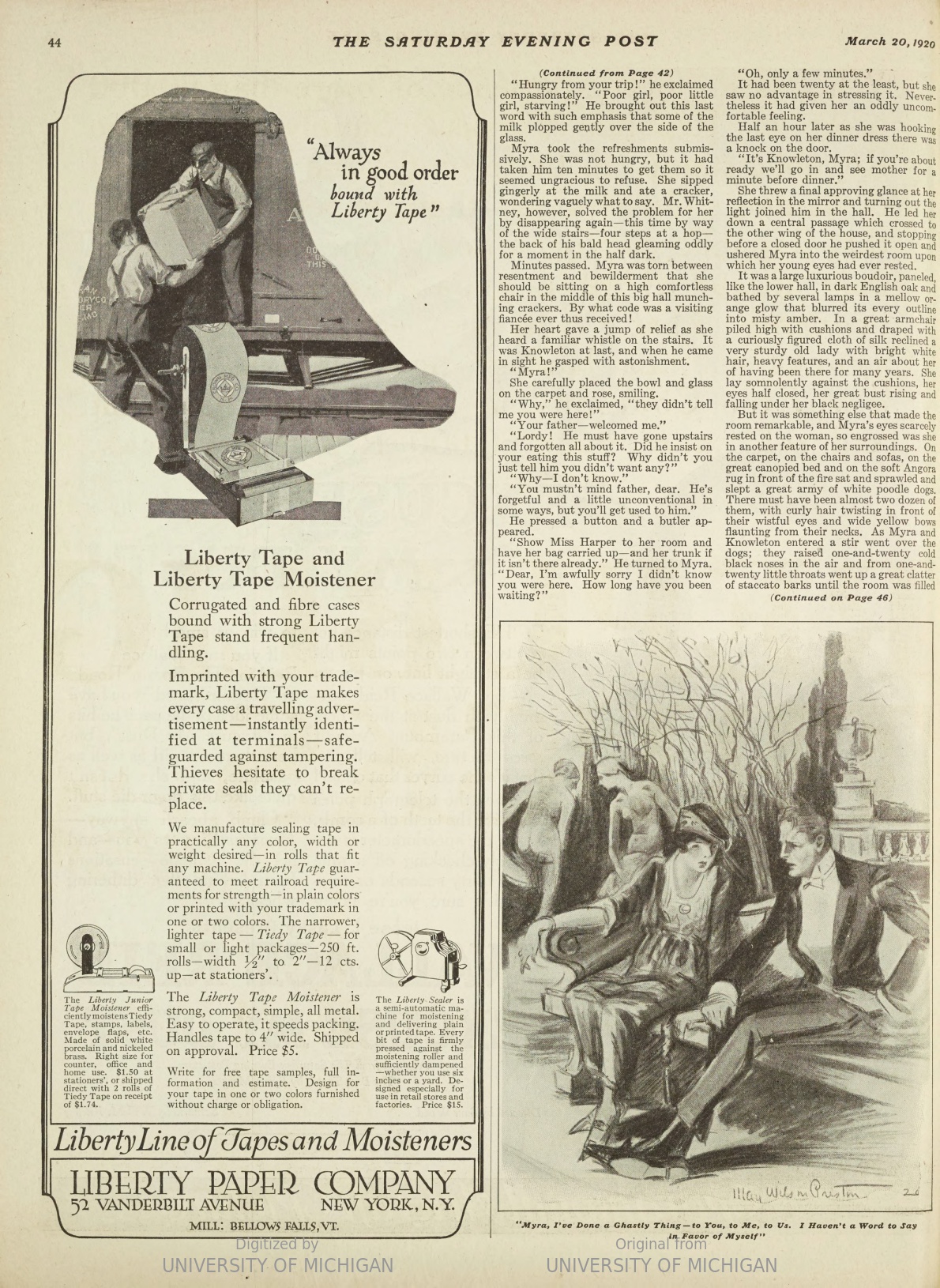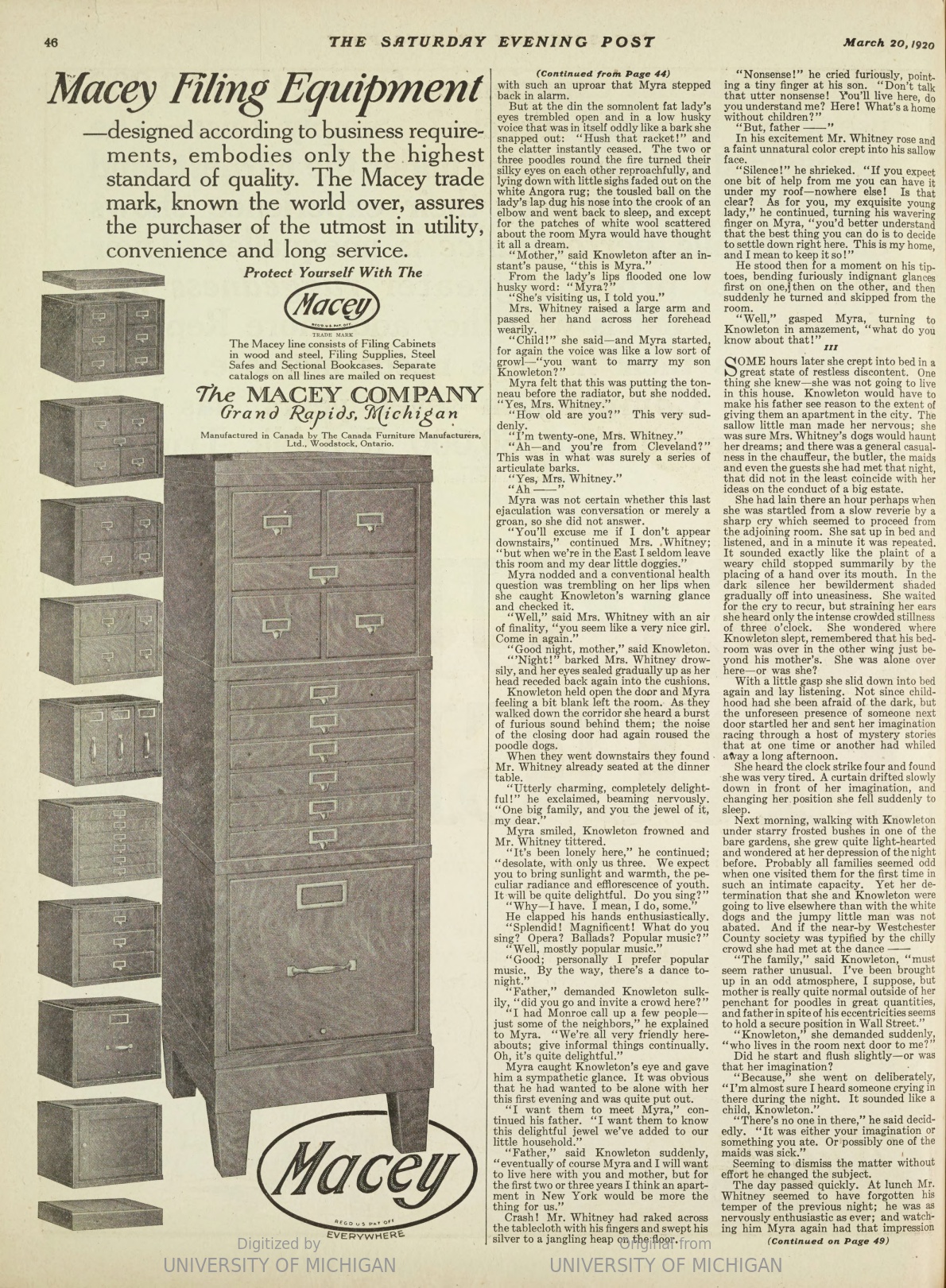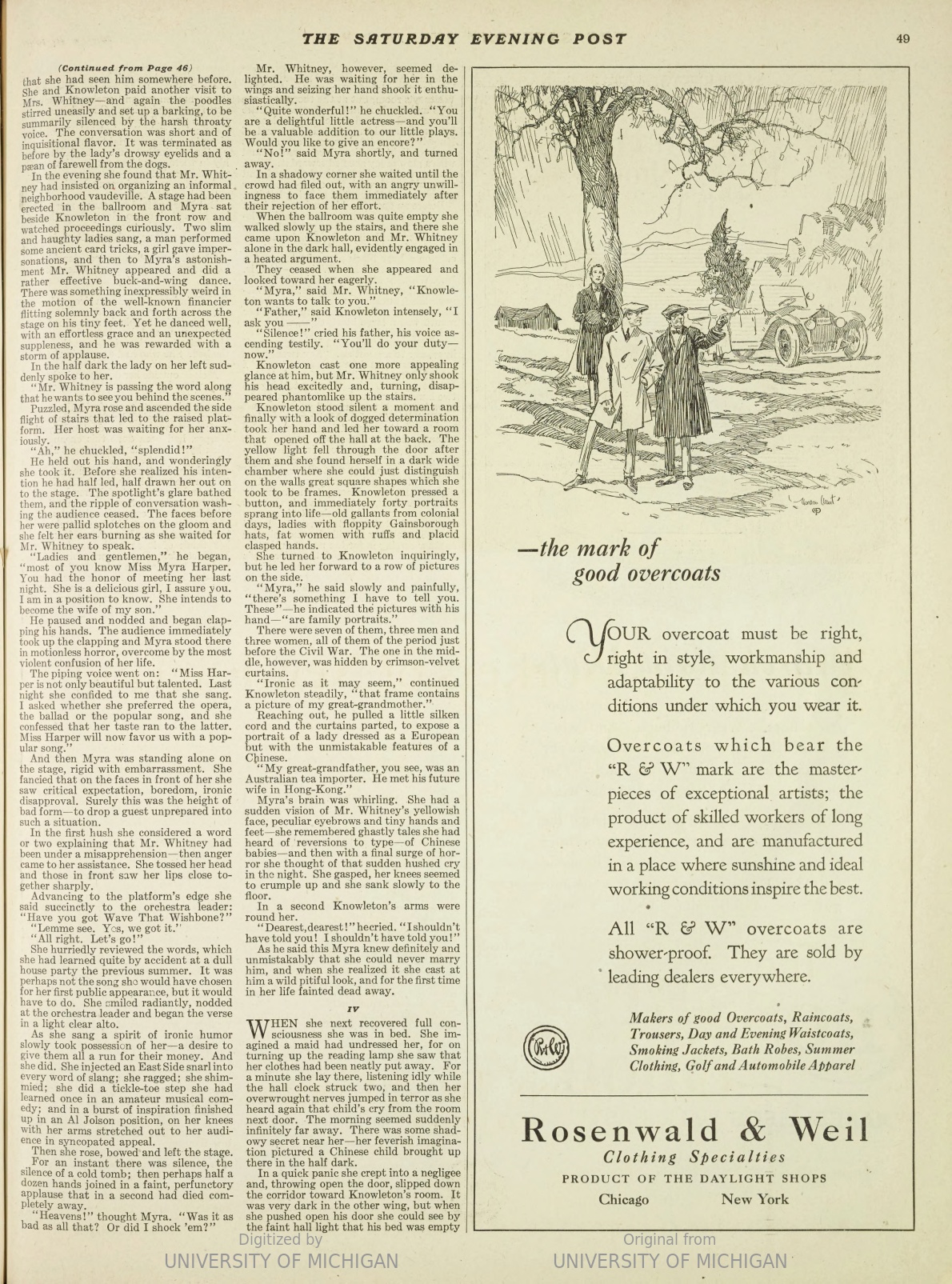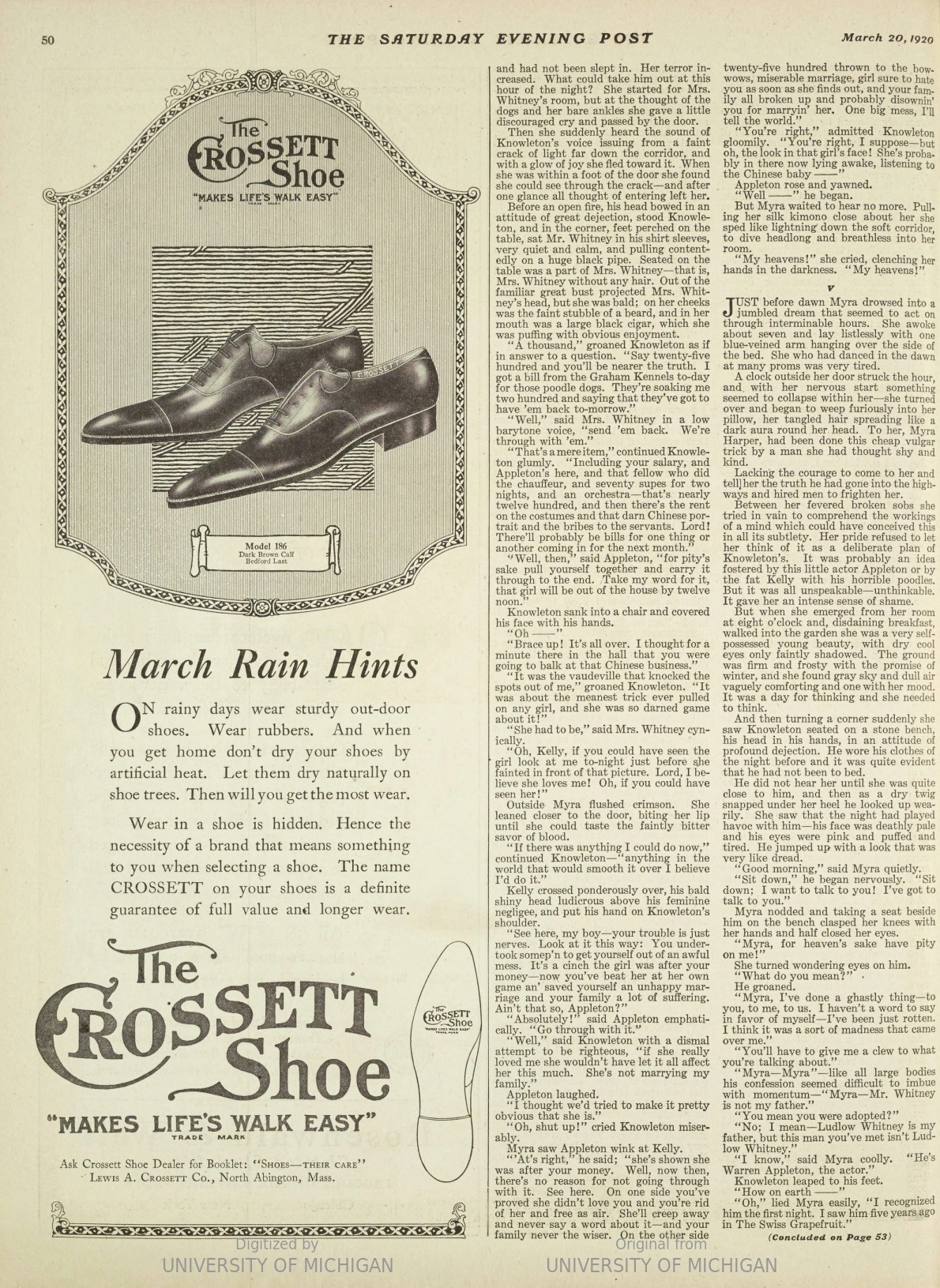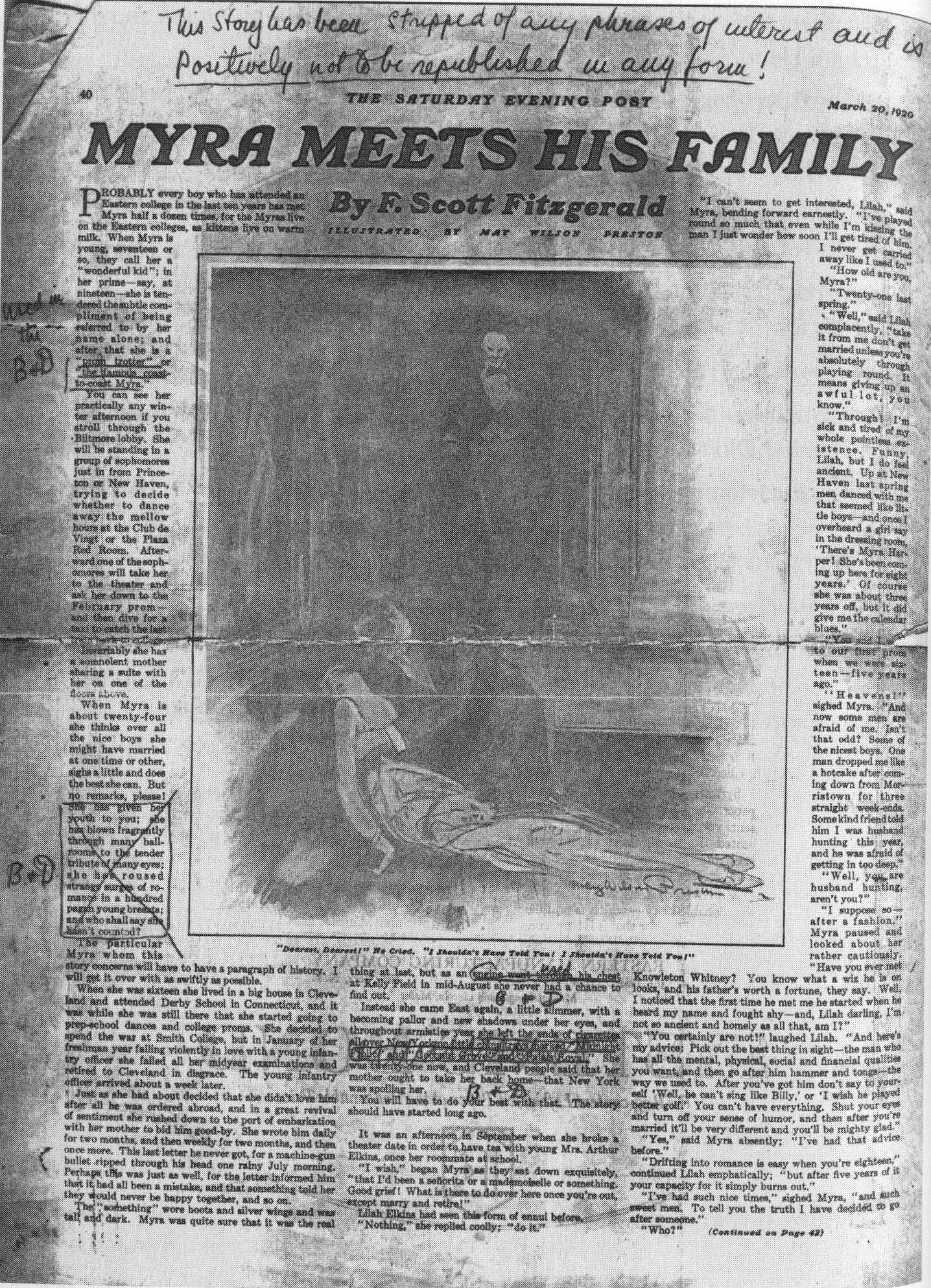
Myra Meets his Family
by F. Scott Fitzgerald
Probably every boy who has attended an Eastern college in the last ten years has met Myra half a dozen times, for the Myras live on the Eastern colleges, as kittens live on warm milk. When Myra is young, seventeen or so, they call her a “wonderful kid”; in her prime—say, at nineteen—she is tendered the subtle compliment of being referred to by her name alone; and after that she is a “prom trotter” or “the famous coast-to-coast Myra.”
You can see her practically any winter afternoon if you stroll through the Biltmore lobby. She will be standing in a group of sophomores just in from Princeton or New Haven, trying to decide whether to dance away the mellow hours at the Club de Vingt or the Plaza Red Room. Afterward one of the sophomores will take her to the theater and ask her down to the February prom—and then dive for a taxi to catch the last train back to college.
Invariably she has a somnolent mother sharing a suite with her on one of the floors above.
When Myra is about twenty-four she thinks over all the nice boys she might have married at one time or other, sighs a little and does the best she can. But no remarks, please! She has given her youth to you; she has blown fragrantly through many ballrooms to the tender tribute of many eyes; she has roused strange surges of romance in a hundred pagan young breasts; and who shall say she hasn’t counted?
The particular Myra whom this story concerns will have to have a paragraph of history. I will get it over with as swiftly as possible.
When she was sixteen she lived in a big house in Cleveland and attended Derby School in Connecticut, and it was while she was still there that she started going to prep-school dances and college proms. She decided to spend the war at Smith College, but in January of her freshman year, falling violently in love with a young infantry officer, she failed all her midyear examinations and retired to Cleveland in disgrace. The young infantry officer arrived about a week later.
Just as she had about decided that she didn’t love him after all he was ordered abroad, and in a great revival of sentiment she rushed down to the port of embarkation with her mother to bid him good-by. She wrote him daily for two months, and then weekly for two months, and then once more. This last letter he never got, for a machine-gun bullet ripped through his head one rainy July morning. Perhaps this was just as well, for the letter informed him that it had all been a mistake, and that something told her they would never be happy together, and so on.
The “something” wore boots and silver wings and was tall and dark. Myra was quite sure that it was the real thing at last, but as an engine went through his chest at Kelly Field in mid-August she never had a chance to find out.
Instead she came East again, a little slimmer, with a becoming pallor and new shadows under her eyes, and throughout armistice year she left the ends of cigarettes all over New York on little china trays marked “Midnight Frolic” and “Coconut Grove” and “Palais Royal.” She was twenty-one now, and Cleveland people said that her mother ought to take her back home—that New York was spoiling her.
You will have to do your best with that. The story should have started long ago.
***
It was an afternoon in September when she broke a theater date in order to have tea with young Mrs. Arthur Elkins, once her roommate at school.
“I wish,” began Myra as they sat down exquisitely, “that I’d been a senorita or a mademoiselle or something. Good grief! What is there to do over here once you’re out, except marry and retire!”
Lilah Elkins had seen this form of ennui before.
“Nothing,” she replied coolly; “do it.”
“I can’t seem to get interested, Lilah,” said Myra, bending forward earnestly. “I’ve played round so much that even while I’m kissing the man I just wonder how soon I’ll get tired of him. I never get carried away like I used to.”
“How old are you, Myra?”
“Twenty-one last spring.”
“Well,” said Lilah complacently, “take it from me, don’t get married unless you’re absolutely through playing round. It means giving up an awful lot, you know.”
“Through! I’m sick and tired of my whole pointless existence. Funny, Lilah, but I do feel ancient. Up at New Haven last spring men danced with me that seemed like little boys—and once I overheard a girl say in the dressing room, ‘There’s Myra Harper! She’s been coming up here for eight years.’ Of course she was about three years off, but it did give me the calendar blues.”
“You and I went to our first prom when we were sixteen—five years ago.”
“Heavens!” sighed Myra. “And now some men are afraid of me. Isn’t that odd? Some of the nicest boys. One man dropped me like a hotcake after coming down from Morristown for three straight weekends. Some kind friend told him I was husband hunting this year, and he was afraid of getting in too deep.”
“Well, you are husband hunting, aren’t you?”
“I suppose so—after a fashion.” Myra paused and looked about her rather cautiously. “Have you ever met Knowleton Whitney? You know what a wiz he is on looks, and his father’s worth a fortune, they say. Well, I noticed that the first time he met me he started when he heard my name and fought shy—and, Lilah darling, I’m not so ancient and homely as all that, am I?”
“You certainly are not!” laughed Lilah. “And here’s my advice: pick out the best thing in sight—the man who has all the mental, physical, social and financial qualities you want, and then go after him hammer and tongs—the way we used to. After you’ve got him don’t say to yourself ‘Well, he can’t sing like Billy,’ or ‘I wish he played better golf.’ You can’t have everything. Shut your eyes and turn off your sense of humor, and then after you’re married it’ll be very different and you’ll be mighty glad.”
“Yes,” said Myra absently; “I’ve had that advice before.”
“Drifting into romance is easy when you’re eighteen,” continued Lilah emphatically; “but after five years of it your capacity for it simply burns out.”
“I’ve had such nice times,” sighed Myra, “and such sweet men. To tell you the truth I have decided to go after someone.”
“Who?”
“Knowleton Whitney. Believe me, I may be a bit blase, but I can still get any man I want.”
“You really want him?”
“Yes—as much as I’ll ever want anyone. He’s smart as a whip, and shy—rather sweetly shy—and they say his family have the best-looking place in Westchester County.”
Lilah sipped the last of her tea and glanced at her wrist watch.
“I’ve got to tear, dear.”
They rose together and, sauntering out on Park Avenue, hailed taxicabs.
“I’m awfully glad, Myra; and I know you’ll be glad too.”
Myra skipped a little pool of water and, reaching her taxi, balanced on the running board like a ballet dancer.
“’By, Lilah. See you soon.”
“Good-by, Myra. Good luck!”
And knowing Myra as she did, Lilah felt that her last remark was distinctly superfluous.
II
That was essentially the reason that one Friday night six weeks later Knowleton Whitney paid a taxi bill of seven dollars and ten cents and with a mixture of emotions paused beside Myra on the Biltmore steps.
The outer surface of his mind was deliriously happy, but just below that was a slowly hardening fright at what he had done. He, protected since his freshman year at Harvard from the snares of fascinating fortune hunters, dragged away from several sweet young things by the acquiescent nape of his neck, had taken advantage of his family’s absence in the West to become so enmeshed in the toils that it was hard to say which was toils and which was he.
The afternoon had been like a dream: November twilight along Fifth Avenue after the matinee, and he and Myra looking out at the swarming crowds from the romantic privacy of a hansom cab— quaint device—then tea at the Ritz and her white hand gleaming on the arm of a chair beside him; and suddenly quick broken words. After that had come the trip to the jeweler’s and a mad dinner in some little Italian restaurant where he had written “Do you?” on the back of the bill of fare and pushed it over for her to add the ever-miraculous “You know I do!” And now at the day’s end they paused on the Biltmore steps.
“Say it,” breathed Myra close to his ear.
He said it. Ah, Myra, how many ghosts must have flitted across your memory then!
“You’ve made me so happy, dear,” she said softly.
“No—you’ve made me happy. Don’t you know—Myra——”
“I know.”
“For good?”
“For good. I’ve got this, you see.” And she raised the diamond solitaire to her lips. She knew how to do things, did Myra.
“Good night.”
“Good night. Good night.”
Like a gossamer fairy in shimmering rose she ran up the wide stairs and her cheeks were glowing wildly as she rang the elevator bell.
At the end of a fortnight she got a telegraph from him saying that his family had returned from the West and expected her up in Westchester County for a week’s visit. Myra wired her train time, bought three new evening dresses and packed her trunk.
It was a cool November evening when she arrived, and stepping from the train in the late twilight she shivered slightly and looked eagerly round for Knowleton. The station platform swarmed for a moment with men returning from the city; there was a shouting-medley of wives and chauffeurs, and a great snorting of automobiles as they backed and turned and slid away. Then before she realized it the platform was quite deserted and not a single one of the luxurious cars remained. Knowleton must have expected her on another train.
With an almost inaudible “Damn!” she started toward the Elizabethan station to telephone, when suddenly she was accosted by a very dirty, dilapidated man who touched his ancient cap to her and addressed her in a cracked, querulous voice.
“You Miss Harper?”
“Yes,” she confessed, rather startled. Was this unmentionable person by any wild chance the chauffeur?
“The chauffeur’s sick,” he continued in a high whine. “I’m his son.”
Myra gasped.
“You mean Mr. Whitney’s chauffeur?”
“Yes; he only keeps just one since the war. Great on economizin’—regelar Hoover.” He stamped his feet nervously and smacked enormous gauntlets together. “Well, no use waitin’ here gabbin’ in the cold. Le’s have your grip.”
Too amazed for words and not a little dismayed, Myra followed her guide to the edge of the platform, where she looked in vain for a car. But she was not left to wonder long, for the person led her steps to a battered old flivver, wherein was deposited her grip.
“Big car’s broke,” he explained. “Have to use this or walk.”
He opened the front door for her and nodded.
“Step in.”
“I b’lieve I’ll sit in back if you don’t mind.”
“Surest thing you know,” he cackled, opening the back door. “I thought the trunk bumpin’ round back there might make you nervous.”
“What trunk?”
“Yourn.”
“Oh, didn’t Mr. Whitney—can’t you make two trips?”
He shook his head obstinately.
”Wouldn’t allow it. Not since the war. Up to rich people to set ’n example; that’s what Mr. Whitney says. Le’s have your check, please.”
As he disappeared Myra tried in vain to conjure up a picture of the chauffeur if this was his son. After a mysterious argument with the station agent he returned, gasping violently, with the trunk on his back. He deposited it in the rear seat and climbed up front beside her.
It was quite dark when they swerved out of the road and up a long dusky driveway to the Whitney place, whence lighted windows flung great blots of cheerful, yellow light over the gravel and grass and trees. Even now she could see that it was very beautiful, that its blurred outline was Georgian Colonial and that great shadowy garden parks were flung out at both sides. The car plumped to a full stop before a square stone doorway and the chauffeur’s son climbed out after her and pushed open the outer door.
“Just go right in,” he cackled; and as she passed the threshold she heard him softly shut the door, closing out himself and the dark.
Myra looked round her. She was in a large somber hall paneled in old English oak and lit by dim shaded lights clinging like luminous yellow turtles at intervals along the wall. Ahead of her was a broad staircase and on both sides there were several doors, but there was no sight or sound of life, and an intense stillness seemed to rise ceaselessly from the deep crimson carpet.
She must have waited there a full minute before she began to have that unmistakable sense of someone looking at her. She forced herself to turn casually round.
A sallow little man, bald and clean shaven, trimly dressed in a frock coat and white spats, was standing a few yards away regarding her quizzically. He must have been fifty at the least, but even before he moved she had noticed a curious alertness about him—something in his pose which promised that it had been instantaneously assumed and would be instantaneously changed in a moment. His tiny hands and feet and the odd twist to his eyebrows gave him a faintly elfish expression, and she had one of those vague transient convictions that she had seen him before, many years ago.
For a minute they stared at each other in silence and then she flushed slightly and discovered a desire to swallow.
“I suppose you’re Mr. Whitney.” She smiled faintly and advanced a step toward him. “I’m Myra Harper.”
For an instant longer he remained silent and motionless, and it flashed across Myra that he might be deaf; then suddenly he jerked into spirited life exactly like a mechanical toy started by the pressure of a button.
“Why, of course—why, naturally. I know—ah!” he exclaimed excitedly in a high-pitched elfin voice. Then raising himself on his toes in a sort of attenuated ecstasy of enthusiasm and smiling a wizened smile, he minced toward her across the dark carpet.
She blushed appropriately.
“That’s awfully nice of——”
“Ah!” he went on. “You must be tired; a rickety, cindery, ghastly trip, I know. Tired and hungry and thirsty, no doubt, no doubt!” He looked round him indignantly. “The servants are frightfully inefficient in this house!”
Myra did not know what to say to this, so she made no answer. After an instant’s abstraction Mr. Whitney crossed over with his furious energy and pressed a button; then almost as if he were dancing he was by her side again, making thin, disparaging gestures with his hands.
“A little minute,” he assured her, “sixty seconds, scarcely more. Here!”
He rushed suddenly to the wall and with some effort lifted a great carved Louis Fourteenth chair and set it down carefully in the geometrical center of the carpet.
“Sit down—won’t you? Sit down! I’ll go get you something. Sixty seconds at the outside.”
She demurred faintly, but he kept on repeating “Sit down!” in such an aggrieved yet hopeful tone that Myra sat down. Instantly her host disappeared.
She sat there for five minutes and a feeling of oppression fell over her. Of all the receptions she had ever received this was decidedly the oddest—for though she had read somewhere that Ludlow Whitney was considered one of the most eccentric figures in the financial world, to find a sallow, elfin little man who, when he walked, danced was rather a blow to her sense of form. Had he gone to get Knowleton! She revolved her thumbs in interminable concentric circles.
Then she started nervously at a quick cough at her elbow. It was Mr. Whitney again. In one hand he held a glass of milk and in the other a blue kitchen bowl full of those hard cubical crackers used in soup.
“Hungry from your trip!” he exclaimed compassionately. “Poor girl, poor little girl, starving!” He brought out this last word with such emphasis that some of the milk plopped gently over the side of the glass.
Myra took the refreshments submissively. She was not hungry, but it had taken him ten minutes to get them so it seemed ungracious to refuse. She sipped gingerly at the milk and ate a cracker, wondering vaguely what to say. Mr. Whitney, however, solved the problem for her by disappearing again—this time by way of the wide stairs—four steps at a hop—the back of his bald head gleaming oddly for a moment in the half dark.
Minutes passed. Myra was torn between resentment and bewilderment that she should be sitting on a high comfortless chair in the middle of this big hall munching crackers. By what code was a visiting fiancee ever thus received!
Her heart gave a jump of relief as she heard a familiar whistle on the stairs. It was Knowleton at last, and when he came in sight he gasped with astonishment.
“Myra!”
She carefully placed the bowl and glass on the carpet and rose, smiling.
“Why,” he exclaimed, “they didn’t tell me you were here!”
“Your father—welcomed me.”
“Lordy! He must have gone upstairs and forgotten all about it. Did he insist on your eating this stuff? Why didn’t you just tell him you didn’t want any?”
“Why—I don’t know.”
“You musn’t mind father, dear. He’s forgetful and a little unconventional in some ways, but you’ll get used to him.”
He pressed a button and a butler appeared.
“Show Miss Harper to her room and have her bag carried up—and her trunk if it isn’t there already.” He turned to Myra. “Dear, I’m awfully sorry I didn’t know you were here. How long have you been waiting?”
“Oh, only a few minutes.”
It had been twenty at the least, but she saw no advantage in stressing it. Nevertheless it had given her an oddly uncomfortable feeling.
Half an hour later as she was hooking the last eye on her dinner dress there was a knock on the door.
“It’s Knowleton, Myra; if you’re about ready we’ll go in and see mother for a minute before dinner.”
She threw a final approving glance at her reflection in the mirror and turning out the light joined him in the hall. He led her down a central passage which crossed to the other wing of the house, and stopping before a closed door he pushed it open and ushered Myra into the weirdest room upon which her young eyes had ever rested.
It was a large luxurious boudoir, paneled, like the lower hall, in dark English oak and bathed by several lamps in a mellow orange glow that blurred its every outline into misty amber. In a great armchair piled high with cushions and draped with a curiously figured cloth of silk reclined a very sturdy old lady with bright white hair, heavy features, and an air about her of having been there for many years. She lay somnolently against the cushions, her eyes half closed, her great bust rising and falling under her black negligee.
But it was something else that made the room remarkable, and Myra’s eyes scarcely rested on the woman, so engrossed was she in another feature of her surroundings. On the carpet, on the chairs and sofas, on the great canopied bed and on the soft Angora rug in front of the fire sat and sprawled and slept a great array of white poodle dogs. There must have been almost two dozen of them, with curly hair twisting in front of their wistful eyes and wide yellow bows flaunting from their necks. As Myra and Knowleton entered a stir went over the dogs; they raised one-and-twenty cold black noses in the air and from one-and-twenty little throats went up a great clatter of staccato barks until the room was filled with such an uproar that Myra stepped back in alarm.
But at the din the somnolent fat lady’s eyes trembled open and in a low husky voice that was in itself oddly like a bark she snapped out “Hush that racket!” and the clatter instantly ceased. The two or three poodles round the fire turned their silky eyes on each other reproachfully, and lying down with little sighs faded out on the white Angora rug; the tousled ball on the lady’s lap dug his nose into the crook of an elbow and went back to sleep, and except for the patches of white wool scattered about the room Myra would have thought it all a dream.
“Mother,” said Knowleton after an instant’s pause, “this is Myra.”
From the lady’s lips flooded one low husky word: “Myra?”
“She’s visiting us, I told you.”
Mrs. Whitney raised a large arm and passed her hand across her forehead wearily.
“Child!” she said—and Myra started, for again the voice was like a low sort of growl—“you want to marry my son Knowleton?”
Myra felt that this was putting the tonneau before the radiator, but she nodded. “Yes, Mrs. Whitney.”
“How old are you?” This very suddenly.
“I’m twenty-one, Mrs. Whitney.”
“Ah—and you’re from Cleveland?” This was in what was surely a series of articulate barks.
“Yes, Mrs. Whitney.”
“Ah——”
Myra was not certain whether this last ejaculation was conversation or merely a groan, so she did not answer.
“You’ll excuse me if I don’t appear downstairs,” continued Mrs. Whitney; “but when we’re in the East I seldom leave this room and my dear little doggies.”
Myra nodded and a conventional health question was trembling on her lips when she caught Knowleton’s warning glance and checked it.
“Well,” said Mrs. Whitney with an air of finality, “you seem like a very nice girl. Come in again.”
“Good night, mother,” said Knowleton.”
“’Night!” barked Mrs. Whitney drowsily, and her eyes sealed gradually up as her head receded back again into the cushions.
Knowleton held open the door and Myra feeling a bit blank left the room. As they walked down the corridor she heard a burst of furious sound behind them; the noise of the closing door had again roused the poodle dogs.
When they went downstairs they found Mr. Whitney already seated at the dinner table.
“Utterly charming, completely delightful!” he exclaimed, beaming nervously. “One big family, and you the jewel of it, my dear.”
Myra smiled, Knowleton frowned and Mr. Whitney tittered.
“It’s been lonely here,” he continued; “desolate, with only us three. We expect you to bring sunlight and warmth, the peculiar radiance and efflorescence of youth. It will be quite delightful. Do you sing?”
“Why—I have. I mean, I do, some.”
He clapped his hands enthusiastically.
“Splendid! Magnificent! What do you sing? Opera? Ballads? Popular music?”
“Well, mostly popular music.”
“Good; personally I prefer popular music. By the way, there’s a dance to-night.”
“Father,” demanded Knowleton sulkily, “did you go and invite a crowd here?”
“I had Monroe call up a few people—just some of the neighbors,” he explained to Myra. “We’re all very friendly hereabouts; give informal things continually. Oh, it’s quite delightful.”
Myra caught Knowleton’s eye and gave him a sympathetic glance. It was obvious that he had wanted to be alone with her this first evening and was quite put out.
“I want them to meet Myra,” continued his father. “I want them to know this delightful jewel we’ve added to our little household.”
“Father,” said Knowleton suddenly, “eventually of course Myra and I will want to live here with you and mother, but for the first two or three years I think an apartment in New York would be more the thing for us.”
Crash! Mr. Whitney had raked across the tablecloth with his fingers and swept his silver to a jangling heap on the floor.
“Nonsense!” he cried furiously, pointing a tiny finger at his son. “Don’t talk that utter nonsense! You’ll live here, do you understand me? Here! What’s a home without children?”
“But, father——”
In his excitement Mr. Whitney rose and a faint unnatural color crept into his sallow face.
“Silence!” he shrieked. “If you expect one bit of help from me you can have it under my roof—nowhere else! Is that clear? As for you my exquisite young lady,” he continued, turning his wavering finger on Myra, “you’d better understand that the best thing you can do is to decide to settle down right here. This is my home, and I mean to keep it so.”
He stood then for a moment on his tiptoes, bending furiously indignant glances first on one, then on the other, and then suddenly he turned and skipped from the room.
“Well,” gasped Myra, turning to Knowleton in amazement, “what do you know about that!”
III
Some hours later she crept into bed in a great state of restless discontent. One thing she knew—she was not going to live in this house. Knowleton would have to make his father see reason to the extent of giving them an apartment in the city. The sallow little man made her nervous, she was sure Mrs. Whitney’s dogs would haunt her dreams; and there was a general casualness in the chauffeur, the butler, the maids and even the guests she had met that night, that did not in the least coincide with her ideas on the conduct of a big estate.
She had lain there an hour perhaps when she was startled from a slow reverie by a sharp cry which seemed to proceed from the adjoining room. She sat up in bed and listened, and in a minute it was repeated. It sounded exactly like the plaint of a weary child stopped summarily by the placing of a hand over its mouth. In the dark silence her bewilderment shaded gradually off into uneasiness. She waited for the cry to recur, but straining her ears she heard only the intense crowded stillness of three o’clock. She wondered where Knowleton slept, remembered that his bedroom was over in the other wing just beyond his mother’s. She was alone over here—or was she?
With a little gasp she slid down into bed again and lay listening. Not since childhood had she been afraid of the dark, but the unforeseen presence of someone next door startled her and sent her imagination racing through a host of mystery stories that at one time or another had whiled away a long afternoon.
She heard the clock strike four and found she was very tired. A curtain drifted slowly down in front of her imagination, and changing her position she fell suddenly to sleep.
Next morning, walking with Knowleton under starry frosted bushes in one of the bare gardens, she grew quite light-hearted and wondered at her depression of the night before. Probably all families seemed odd when one visited them for the first time in such an intimate capacity. Yet her determination that she and Knowleton were going to live elsewhere than with the white dogs and the jumpy little man was not abated. And if the near-by Westchester County society was typified by the chilly crowd she had met at the dance——
“The family,” said Knowleton, “must seem rather unusual. I’ve been brought up in an odd atmosphere, I suppose, but mother is really quite normal outside of her penchant for poodles in great quantities, and father in spite of his eccentricities seems to hold a secure position in Wall Street.”
“Knowleton,” she demanded suddenly, “who lives in the room next door to me?”
Did he start and flush slightly—or was that her imagination?
“Because,” she went on deliberately, “I’m almost sure I heard someone crying in there during the night. It sounded like a child, Knowleton.”
“There’s no one in there,” he said decidedly. “It was either your imagination or something you ate. Or possibly one of the maids was sick.”
Seeming to dismiss the matter without effort he changed the subject.
The day passed quickly. At lunch Mr. Whitney seemed to have forgotten his temper of the previous night; he was as nervously enthusiastic as ever; and watching him Myra again had that impression that she had seen him somewhere before. She and Knowleton paid another visit to Mrs. Whitney—and again the poodles stirred uneasily and set up a barking, to be summarily silenced by the harsh throaty voice. The conversation was short and of inquisitional flavor. It was terminated as before by the lady’s drowsy eyelids and a paean of farewell from the dogs.
In the evening she found that Mr. Whitney had insisted on organizing an informal neighborhood vaudeville. A stage had been erected in the ballroom and Myra sat beside Knowleton in the front row and watched proceedings curiously. Two slim and haughty ladies sang, a man performed some ancient card tricks, a girl gave impersonations, and then to Myra’s astonishment Mr. Whitney appeared and did a rather effective buck-and-wing dance. There was something inexpressibly weird in the motion of the well-known financier flitting solemnly back and forth across the stage on his tiny feet. Yet he danced well, with an effortless grace and an unexpected suppleness, and he was rewarded with a storm of applause.
In the half dark the lady on her left suddenly spoke to her.
“Mr. Whitney is passing the word along that he wants to see you behind the scenes.”
Puzzled, Myra rose and ascended the side flight of stairs that led to the raised platform. Her host was waiting for her anxiously.
“Ah,” he chuckled, “splendid!”
He held out his hand, and wonderingly she took it. Before she realized his intention he had half led, half drawn her out on to the stage. The spotlight’s glare bathed them, and the ripple of conversation washing the audience ceased. The faces before her were pallid splotches on the gloom and she felt her ears burning as she waited for Mr. Whitney to speak.
“Ladies and gentlemen,” he began, “most of you know Miss Myra Harper. You had the honor of meeting her last night. She is a delicious girl, I assure you. I am in a position to know. She intends to become the wife of my son.”
He paused and nodded and began clapping his hands. The audience immediately took up the clapping and Myra stood there in motionless horror, overcome by the most violent confusion of her life.
The piping voice went on: “Miss Harper is not only beautiful but talented. Last night she confided to me that she sang. I asked whether she preferred the opera, the ballad or the popular song, and she confessed that her taste ran to the latter. Miss Harper will now favor us with a popular song.”
And then Myra was standing alone on the stage, rigid with embarrassment. She fancied that on the faces in front of her she saw critical expectation, boredom, ironic disapproval. Surely this was the height of bad form—to drop a guest unprepared into such a situation.
In the first hush she considered a word or two explaining that Mr. Whitney had been under a misapprehension—then anger came to her assistance. She tossed her head and those in front saw her lips close together sharply.
Advancing to the platform’s edge she said succinctly to the orchestra leader: “Have you got ‘Wave That Wishbone’?”
“Lemme see. Yes, we got it.”
“All right. Let’s go!”
She hurriedly reviewed the words, which she had learned quite by accident at a dull house party the previous summer. It was perhaps not the song she would have chosen for her first public appearance, but it would have to do. She smiled radiantly, nodded at the orchestra leader and began the verse in a light clear alto.
As she sang a spirit of ironic humor slowly took possession of her—a desire to give them all a run for their money. And she did. She injected an East Side snarl into every word of slang; she ragged; she shimmied, she did a tickle-toe step she had learned once in an amateur musical comedy; and in a burst of inspiration finished up in an Al Jolson position, on her knees with her arms stretched out to her audience in syncopated appeal.
Then she rose, bowed and left the stage.
For an instant there was silence, the silence of a cold tomb; then perhaps half a dozen hands joined in a faint, perfunctory applause that in a second had died completely away.
“Heavens!” thought Myra. “Was it as bad as all that? Or did I shock ’em?”
Mr. Whitney, however, seemed delighted. He was waiting for her in the wings and seizing her hand shook it enthusiastically.
“Quite wonderful!” he chuckled. “You are a delightful little actress—and you’ll be a valuable addition to our little plays. Would you like to give an encore?”
“No!” said Myra shortly, and turned away.
In a shadowy corner she waited until the crowd had filed out with an angry unwillingness to face them immediately after their rejection of her effort.
When the ballroom was quite empty she walked slowly up the stairs, and there she came upon Knowleton and Mr. Whitney alone in the dark hall, evidently engaged in a heated argument.
They ceased when she appeared and looked toward her eagerly.
“Myra,” said Mr. Whitney, “Knowleton wants to talk to you.”
“Father,” said Knowleton intensely, “I ask you——”
“Silence!” cried his father, his voice ascending testily. “You’ll do your duty—now.”
Knowleton cast one more appealing glance at him, but Mr. Whitney only shook his head excitedly and, turning, disappeared phantomlike up the stairs.
Knowleton stood silent a moment and finally with a look of dogged determination took her hand and led her toward a room that opened off the hall at the back. The yellow light fell through the door after them and she found herself in a dark wide chamber where she could just distinguish on the walls great square shapes which she took to be frames. Knowleton pressed a button, and immediately forty portraits sprang into life—old gallants from colonial days, ladies with floppity Gainsborough hats, fat women with ruffs and placid clasped hands.
She turned to Knowleton inquiringly, but he led her forward to a row of pictures on the side.
“Myra,” he said slowly and painfully, “there’s something I have to tell you. These”—he indicated the pictures with his hand—“are family portraits.”
There were seven of them, three men and three women, all of them of the period just before the Civil War. The one in the middle however, was hidden by crimson-velvet curtains.
“Ironic as it may seem,” continued Knowleton steadily, “that frame contains a picture of my great-grandmother.”
Reaching out, he pulled a little silken cord and the curtains parted, to expose a portrait of a lady dressed as a European but with the unmistakable features of a Chinese.
“My great-grandfather, you see, was an Australian tea importer. He met his future wife in Hong-Kong.”
Myra’s brain was whirling. She had a sudden vision of Mr. Whitney’s yellowish face, peculiar eyebrows and tiny hands and feet—she remembered ghastly tales she had heard of reversions to type—of Chinese babies—and then with a final surge of horror she thought of that sudden hushed cry in the night. She gasped, her knees seemed to crumple up and she sank slowly to the floor.
In a second Knowleton’s arms were round her.
“Dearest, dearest!” he cried. “I shouldn’t have told you! I shouldn’t have told you!”
As he said this Myra knew definitely and unmistakably that she could never marry him, and when she realized it she cast at him a wild pitiful look, and for the first time in her life fainted dead away.
IV
When she next recovered full consciousness she was in bed. She imagined a maid had undressed her, for on turning up the reading lamp she saw that her clothes had been neatly put away. For a minute she lay there, listening idly while the hall clock struck two, and then her overwrought nerves jumped in terror as she heard again that child’s cry from the room next door. The morning seemed suddenly infinitely far away. There was some shadowy secret near her—her feverish imagination pictured a Chinese child brought up there in the half dark.
In a quick panic she crept into a negligee and, throwing open the door, slipped down the corridor toward Knowleton’s room. It was very dark in the other wing, but when she pushed open his door she could see by the faint hall light that his bed was empty and had not been slept in. Her terror increased. What could take him out at this hour of the night? She started for Mrs. Whitney’s room, but at the thought of the dogs and her bare ankles she gave a little discouraged cry and passed by the door.
Then she suddenly heard the sound of Knowleton’s voice issuing from a faint crack of light far down the corridor, and with a glow of joy she fled toward it. When she was within a foot of the door she found she could see through the crack—and after one glance all thought of entering left her.
Before an open fire, his head bowed in an attitude of great dejection, stood Knowleton, and in the corner, feet perched on the table, sat Mr. Whitney in his shirt sleeves, very quiet and calm, and pulling contentedly on a huge black pipe. Seated on the table was a part of Mrs. Whitney—that is, Mrs. Whitney without any hair. Out of the familiar great bust projected Mrs. Whitney’s head, but she was bald; on her cheeks was the faint stubble of a beard, and in her mouth was a large black cigar, which she was puffing with obvious enjoyment.
“A thousand,” groaned Knowleton as if in answer to a question. “Say twenty-five hundred and you’ll be nearer the truth. I got a bill from the Graham Kennels to-day for those poodle dogs. They’re soaking me two hundred and saying that they’ve got to have ’em back tomorrow.”
“Well,” said Mrs. Whitney in a low barytone voice, “send ’em back. We’re through with ’em.”
“That’s a mere item,” continued Knowleton glumly. “Including your salary, and Appleton’s here, and that fellow who did the chauffeur, and seventy supes for two nights, and an orchestra—that’s nearly twelve hundred, and then there’s the rent on the costumes and that darn Chinese portrait and the bribes to the servants. Lord! There’ll probably be bills for one thing or another coming in for the next month.”
“Well, then,” said Appleton, “for pity’s sake pull yourself together and carry it through to the end. Take my word for it, that girl will be out of the house by twelve noon.”
Knowleton sank into a chair and covered his face with his hands.
“Oh——”
“Brace up! It’s all over. I thought for a minute there in the hall that you were going to balk at that Chinese business.”
“It was the vaudeville that knocked the spots out of me,” groaned Knowleton. “It was about the meanest trick ever pulled on any girl, and she was so darned game about it!”
“She had to be,” said Mrs. Whitney cynically.
“Oh, Kelly, if you could have seen the girl look at me to-night just before she fainted in front of that picture. Lord, I believe she loves me! Oh, if you could have seen her!”
Outside Myra flushed crimson. She leaned closer to the door, biting her lip until she could taste the faintly bitter savor of blood.
“If there was anything I could do now,” continued Knowleton—“anything in the world that would smooth it over I believe I’d do it.”
Kelly crossed ponderously over, his bald shiny head ludicrous above his feminine negligee, and put his hand on Knowleton’s shoulder.
“See here, my boy—your trouble is just nerves. Look at it this way: you undertook someth’n to get yourself out of an awful mess. It’s a cinch the girl was after your money—now you’ve beat her at her own game an’ saved yourself an unhappy marriage and your family a lot of suffering. Ain’t that so, Appleton?”
“Absolutely!” said Appleton emphatically. “Go through with it.”
“Well” said Knowleton with a dismal attempt to be righteous, “if she really loved me she wouldn’t have let it all affect her this much. She’s not marrying my family.”
Appleton laughed.
“I thought we’d tried to make it pretty obvious that she is.”
“Oh, shut up!” cried Knowleton miserably.
Myra saw Appleton wink at Kelly.
“’At’s right,” he said; “she’s shown she was after your money. Well, now then, there’s no reason for not going through with it. See here. On one side you’ve proved she didn’t love you and you’re rid of her and free as air. She’ll creep away and never say a word about it— and your family never the wiser. On the other side twenty-five hundred thrown to the bow-wows, miserable marriage, girl sure to hate you as soon as she finds out, and your family all broken up and probably disownin’ you for marryin’ her. One big mess, I’ll tell the world.”
“You’re right,” admitted Knowleton gloomily. “You’re right, I suppose—but oh, the look in that girl’s face! She’s probably in there now lying awake, listening to the Chinese baby——”
Appleton rose and yawned.
“Well——” he began.
But Myra waited to hear no more. Pulling her silk kimono close about her she sped like lightning down the soft corridor, to dive headlong and breathless into her room.
“My heavens!” she cried, clenching her hands in the darkness. “My heavens!”
V
Just before dawn Myra drowsed into a jumbled dream that seemed to act on through interminable hours. She awoke about seven and lay listlessly with one blue-veined arm hanging over the side of the bed. She who had danced in the dawn at many proms was very tired.
A clock outside her door struck the hour, and with her nervous start something seemed to collapse within her—she turned over and began to weep furiously into her pillow, her tangled hair spreading like a dark aura round her head. To her, Myra Harper, had been done this cheap vulgar trick by a man she had thought shy and kind.
Lacking the courage to come to her and tell her the truth he had gone into the highways and hired men to frighten her.
Between her fevered broken sobs she tried in vain to comprehend the workings of a mind which could have conceived this in all its subtlety. Her pride refused to let her think of it as a deliberate plan of Knowleton’s. It was probably an idea fostered by this little actor Appleton or by the fat Kelly with his horrible poodles. But it was all unspeakable—unthinkable. It gave her an intense sense of shame.
But when she emerged from her room at eight o’clock and disdaining breakfast, walked into the garden she was a very self-possessed young beauty, with dry cool eyes only faintly shadowed. The ground was firm and frosty with the promise of winter, and she found gray sky and dull air vaguely comforting and one with her mood. It was a day for thinking and she needed to think.
And then turning a corner suddenly she saw Knowleton seated on a stone bench, his head in his hands, in an attitude of profound dejection. He wore his clothes of the night before and it was quite evident that he had not been to bed.
He did not hear her until she was quite close to him, and then as a dry twig snapped under her heel he looked up wearily. She saw that the night had played havoc with him—his face was deathly pale and his eyes were pink and puffed and tired. He jumped up with a look that was very like dread.
“Good morning,” said Myra quietly.
“Sit down,” he began nervously. “Sit down; I want to talk to you! I’ve got to talk to you.”
Myra nodded and taking a seat beside him on the bench clasped her knees with her hands and half closed her eyes.
“Myra, for heaven’s sake have pity on me!”
She turned wondering eyes on him.
“What do you mean?”
He groaned.
“Myra, I’ve done a ghastly thing—to you, to me, to us. I haven’t a word to say in favor of myself—I’ve been just rotten. I think it was a sort of madness that came over me.”
“You’ll have to give me a clew to what you’re talking about.”
“Myra—Myra”—like all large bodies his confession seemed difficult to imbue with momentum—“Myra—Mr. Whitney is not my father.”
“You mean you were adopted?”
“No; I mean—Ludlow Whitney is my father, but this man you’ve met isn’t Ludlow Whitney.”
“I know,” said Myra coolly. “He’s Warren Appleton, the actor.”
Knowleton leaped to his feet.
“How on earth——”
“Oh,” lied Myra easily, “I recognized him the first night. I saw him five years ago in The Swiss Grapefruit.”
At this Knowleton seemed to collapse utterly. He sank down limply on to the bench.
“You knew?”
“Of course! How could I help it? It simply made me wonder what it was all about.”
With a great effort he tried to pull himself together.
“I’m going to tell you the whole story, Myra.”
“I’m all ears.”
“Well, it starts with my mother—my real one, not the woman with those idiotic dogs; she’s an invalid and I’m her only child. Her one idea in life has always been for me to make a fitting match, and her idea of a fitting match centers round social position in England. Her greatest disappointment was that I wasn’t a girl so I could marry a title, instead she wanted to drag me to England—marry me off to the sister of an earl or the daughter of a duke. Why, before she’d let me stay up here alone this fall she made me promise I wouldn’t go to see any girl more than twice. And then I met you.”
He paused for a second and continued earnestly: “You were the first girl in my life whom I ever thought of marrying. You intoxicated me, Myra. It was just as though you were making me love you by some invisible force.”
“I was,” murmured Myra.
“Well, that first intoxication lasted a week, and then one day a letter came from mother saying she was bringing home some wonderful English girl, Lady Helena Something-or-Other. And the same day a man told me that he’d heard I’d been caught by the most famous husband hunter in New York. Well, between these two things I went half crazy. I came into town to see you and call it off—got as far as the Biltmore entrance and didn’t dare. I started wandering down Fifth Avenue like a wild man, and then I met Kelly. I told him the whole story—and within an hour we’d hatched up this ghastly plan. It was his plan—all the details. His histrionic instinct got the better of him and he had me thinking it was the kindest way out.”
“Finish,” commanded Myra crisply.
“Well, it went splendidly, we thought. Everything—the station meeting, the dinner scene, the scream in the night, the vaudeville—though I thought that was a little too much—until—until——Oh, Myra, when you fainted under that picture and I held you there in my arms, helpless as a baby, I knew I loved you. I was sorry then, Myra.”
There was a long pause while she sat motionless, her hands still clasping her knees—then he burst out with a wild plea of passionate sincerity.
“Myra!” he cried. “If by any possible chance you can bring yourself to forgive and forget I’ll marry you when you say, let my family go to the devil, and love you all my life.”
For a long while she considered, and Knowleton rose and began pacing nervously up and down the aisle of bare bushes, his hands in his pockets, his tired eyes pathetic now, and full of dull appeal. And then she came to a decision.
“You’re perfectly sure?” she asked calmly.
“Yes.”
“Very well, I’ll marry you to-day.”
With her words the atmosphere cleared and his troubles seemed to fall from him like a ragged cloak. An Indian summer sun drifted out from behind the gray clouds and the dry bushes rustled gently in the breeze.
“It was a bad mistake,” she continued, “but if you’re sure you love me now, that’s the main thing. We’ll go to town this morning, get a license, and I’ll call up my cousin, who’s a minister in the First Presbyterian Church. We can go West to-night.”
“Myra!” he cried jubilantly. “You’re a marvel and I’m not fit to tie your shoe strings. I’m going to make up to you for this, darling girl.”
And taking her supple body in his arms he covered her face with kisses.
The next two hours passed in a whirl. Myra went to the telephone and called her cousin, and then rushed upstairs to pack. When she came down a shining roadster was waiting miraculously in the drive and by ten o’clock they were bowling happily toward the City.
They stopped for a few minutes at the City Hall and again at the jeweler’s, and then they were in the house of the Reverend Walter Gregory on Sixty-ninth Street, where a sanctimonious gentleman with twinkling eyes and a slight stutter received them cordially and urged them to a breakfast of bacon and eggs before the ceremony.
On the way to the station they stopped only long enough to wire Knowleton’s father, and then they were sitting in their compartment on the Broadway Limited.
“Darn!” exclaimed Myra. “I forgot my bag. Left it at Cousin Walter’s in the excitement.”
“Never mind. We can get a whole new outfit in Chicago.”
She glanced at her wrist watch.
“I’ve got time to telephone him to send it on.”
She rose.
“Don’t be long, dear.”
She leaned down and kissed his forehead.
“You know I couldn’t. Two minutes, honey.”
Outside Myra ran swiftly along the platform and up the steel stairs to the great waiting room, where a man met her—a twinkly-eyed man with a slight stutter.
“How d-did it go, M-myra?”
“Fine! Oh, Walter, you were splendid! I almost wish you’d join the ministry so you could officiate when I do get married.”
“Well—I r-rehearsed for half an hour after I g-got your telephone call.”
“Wish we’d had more time. I’d have had him lease an apartment and buy furniture.”
“H’m,” chuckled Walter. “Wonder how far he’ll go on his honeymoon.”
“Oh, he’ll think I’m on the train till he gets to Elizabeth.” She shook her little fist at the great contour of the marble dome. “Oh, he’s getting off too easy—far too easy!”
“I haven’t f-figured out what the f-fellow did to you, M-myra.”
“You never will, I hope.”
They had reached the side drive and he hailed her a taxicab.
“You’re an angel!” beamed Myra. “And I can’t thank you enough.”
“Well, any time I can be of use t-to you—— By the way, what are you going to do with all the rings?”
Myra looked laughingly at her hand.
“That’s the question,” she said. “I may send them to Lady Helena Something-or-Other—and—well, I’ve always had a strong penchant for souvenirs. Tell the driver ‘Biltmore,’ Walter.”
Notes:
This story was rewritten in St. Paul in December 1919 from an abandoned story called “Lilah Meets His Family.” Submitting story to Harold Ober, Fitzgerald admitted: “I’m afraid its no good and if you agree with me don’t hesitate to send it back. Perhaps if you give me an idea what the matter with it is I’ll be able to rewrite it.” Ober had no trouble selling it to the The Saturday Evening Post for $400 (20 March 1920). Fox studios bought “Myra” in 1920 for $1000 — a good price at that time — and made it into “The Husband Hunter” with Eileen Percy. Its popular appeal did not alter Fitzgerald’s feelings about the story. In 1921 he wrote Ober about English magazine rights: “I believe you have disposed of… Myra Meets His Family which story, however, I never have liked, + do not intend ever republishing in book form.” The reasons for his rejection of the story are not clear. It relies on unlikely plotting, but so do a number of his other commercial stories… The story stakes out the territory of the Eastern rich; and Myra is a readily recognizable Fitzgerald heroine who reappears under a dozen other names in later stories.
Published in The Saturday Evening Post magazine (20 March 1920).
Illustrations by May Wilson Preston.
Page one with F. Scott Fitzgerald's notes ("tearsheets").


